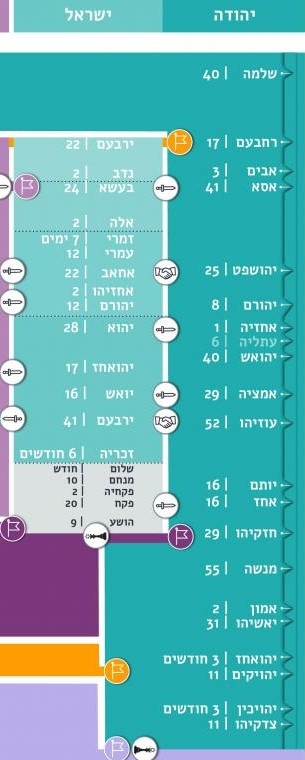Melakhim I Chapter 16 | The Decline of the Kingdom of Israel
When studying the Book of Melakhim, it is highly recommended to pay attention to recurring patterns. These patterns serve as significant tools for understanding the processes occurring in each kingdom—religiously, militarily, and politically. For example, the religious state is measured by the extent and type of idol worship: There is the sin of high shrines dedicated to God, the more severe sin of calves intended for God, and the even graver sin of adopting foreign idol worship. A recurring pattern in the punishment of wicked kings is the destruction of the king’s house and family, often expressed in phrases like, "I will cut off every last male of Yorovam in Israel, bond and free" (14:10). Frequently, the fulfillment of such prophecies occurs after two years of the reign of the wicked king’s son.
In our chapter, the pattern of Yerovam’s punishment is repeated exactly for Basha. The prophet even explicitly connects the two: "I am about to burn up every last trace of Basha and his house; I will make your house like that of Yerovam son of Nevat" (16:3). Why? The answer is simple: Basha, too, replicates the sins of Yerovam: "He did what was evil in the eyes of the Lord, and he followed in Yerovam’s ways; through his sin he led Israel to sin" (15:34).
An interesting phenomenon is the prophet’s dual approach to Basha’s actions in eliminating Yerovam’s house. In Chapter 15, the description of the act conveys a positive tone: "Basha formed a conspiracy against him... when he became king, he struck down all the house of Yerovam... fulfilling the Lord’s word that He had pronounced through His servant Ahiya the Shilonite" (15:27–29). Basha’s destruction of Yerovam’s house was a fulfillment of God’s prophecy! However, in Chapter 16, when summarizing Basha’s sins, it says: "For all the evil he had done in the eyes of the Lord, angering Him with his deeds: for striking down the house of Yerovam" (16:7). Here, the killing of Yerovam is itself considered a sin. Why? The explanation seems straightforward: The purpose of destroying Yerovam’s house was to return the kingdom of Israel to the path of serving God. Once Basha continues precisely in Yerovam’s sins, there was no justification for the destruction. Consequently, the act can now be seen as an unjustified act of murder.
Following the destruction of Basha’s house, the kingdom of Israel reaches a new low. Within seven days, the king is replaced (note the irony in the verse about a king who reigned for seven days: "he died on account of the sins he sinned, doing what was evil in the eyes of the Lord. He followed in the ways of Yerovam and the sin he had committed, which led Israel to sin" (16:19)). At the end of the conflict, Omri becomes king and establishes Shomron as the capital of the kingdom of Israel. His son, Achav, leads Israel to new depths by introducing the idol worship of foreign nations through his wife: "He married Izevel, daughter of King Etbaal of the Sidonians, and went and served Baal and worshiped him. He erected an altar for Baal in the temple of Baal he built in Shomron" (16:31–32).
We are entering a sequence of chapters in the Book of Melakhim that features a relatively rapid turnover of kings across two kingdoms simultaneously: Yehuda and Israel. At times, it can be challenging to keep track of the kings while studying. Attached is a chart of the kings of Yehuda and Israel from Herzog's Tanakh website for your convenience.



This website is constantly being improved. We would appreciate hearing from you. Questions and comments on the classes are welcome, as is help in tagging, categorizing, and creating brief summaries of the classes. Thank you for being part of the Torat Har Etzion community!